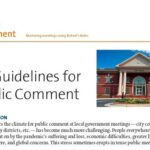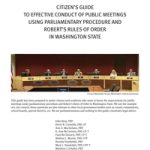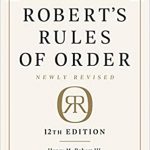parliamentary procedure
Updated November 20, 2022 On the first evening of my exciting trip to Alaska in 2018, Lon Garrison and Timi Tullis treated me to dinner. We spent the entire evening in energetic discussion of Robert’s Rules and meeting management. Lon’s wife shook her head when he got home and said, “You should call yourselves the…
Sometimes after a voice vote that is not unanimous, we see an odd scenario. The chair or the clerk starts trying to figure out who voted for and who voted against. “Let’s see, it looks like the motion passed, with Member B and Member C voting against—you did vote against, didn’t you?” Don’t do this! Trying…
Updated September 20, 2023 The public comment period is an essential part of local government meetings. This new publication offers 50 guidelines for public comment, and includes a sample public comment announcement. It is an update from our 2018 guidelines. These guidelines refer to ordinary business and work or study meetings of councils, boards and…
When city councils, school boards or other public bodies hold their meetings, it is usual to reserve a time in the meeting for members of the public to speak to their elected officials. One common name for this is the public comment period. We recommend that detailed public comment should not be included in the…
Guest post by Colette Collier Trohan. Directors of nonprofit boards will find this outline of their duty of care an invaluable guide. Do you remember being a teenager and ignoring the potential consequences of your actions? Did anyone ever look at you and ask: “What were you thinking?!!!” You weren’t expected to be a perfect child, but…
If you serve as a director on a nonprofit board, you should know the types of remarks that are inappropriate during discussion at a meeting. Robert’s Rules of Order and the common parliamentary law it is based on require that: Directors on a board must be courteous to one another. They must speak to the…
Your Citizen’s Guide to Effective Public Meetings is now available for interested citizens and residents. If you want to know the expectations for public meetings under parliamentary procedure and Robert’s Rules of Order, explained clearly and elegantly, download this Citizen’s Guide today!
Updated July 14, 2021 The different rules for small boards are one of the best-kept secrets of Robert’s Rules of Order. If you serve on a small board (up to about 12 people) you may benefit from the flexibility that the rules for small boards offer. Robert’s Rules of Order Newly Revised, 12th edition says…
Have you ever wondered whether a fill in the blank approach could be useful to your board or council? Sometimes a board of directors has to make hard choices about selling property, giving the executive director a raise, making an appointment or choosing a date to schedule an event. Robert’s Rules of Order offers an…
In the olden days, the standard way to correct meeting minutes was to request the correction at the next meeting, when the meeting minutes were up for approval. Nowadays, since meeting minutes are often circulated in advance, the question becomes a little more complicated. This article explores those complications. According to Robert’s Rules of Order…











